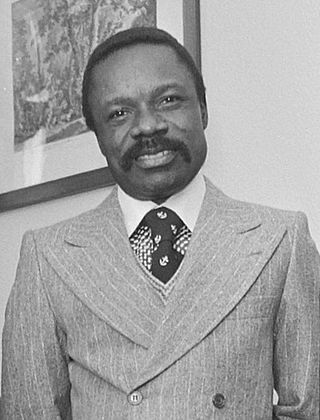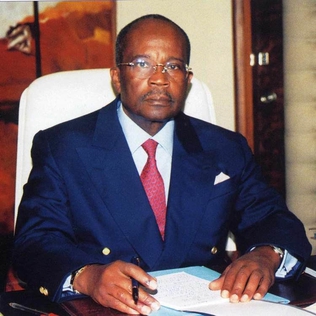Related Research Articles

Gabon, officially the Gabonese Republic, is a country on the Atlantic coast of Central Africa, on the equator, bordered by Equatorial Guinea to the northwest, Cameroon to the north, the Republic of the Congo on the east and south, and the Gulf of Guinea to the west. It has an area of 270,000 square kilometres (100,000 sq mi) and a population of 2.3 million. There are coastal plains, mountains, and a savanna in the east. Libreville is the country's capital and the largest city.
Little is known of the history of Gabon before European contact. Bantu migrants settled the area beginning in the 14th century. Portuguese explorers and traders arrived in the area in the late 15th century. The coast subsequently became a center of the transatlantic slave trade with European slave traders arriving to the region in the 16th century. In 1839 and 1841, France established a protectorate over the coast. In 1849, captives released from a captured slave ship founded Libreville. In 1862–1887, France expanded its control including the interior of the state, and took full sovereignty. In 1910 Gabon became part of French Equatorial Africa and in 1960, Gabon became independent.

The politics of Gabon takes place in a framework of a republic whereby the president of Gabon is head of state and in effect, also the head of government, since he appoints the prime minister and his cabinet. The government is divided into three branches: the executive headed by the prime minister, the legislative that is formed by the two chambers of parliament, and the judicial branch. The judicial branch is technically independent and equal to the two other branches, although in practice, since its judges are appointed by the president, it is beholden to the same president. Since independence the party system is dominated by the conservative Gabonese Democratic Party.

The president of Gabon is the head of state of Gabon. A total of three people have served as president since the post was formed in 1960.

Omar Bongo Ondimba was a Gabonese politician who was the second president of Gabon for almost 42 years, from 1967 until his death in 2009. Bongo was promoted to key positions as a young official under Gabon's first President Léon M'ba in the 1960s, before being elected vice-president in his own right in 1966. In 1967, he succeeded M'ba to become the country's second president, upon the latter's death.

The Gabonese Democratic Party is a political party in Gabon. It was the dominant political party in Gabonese politics from 1961 until 2023, when it was deposed in a coup d'état against President Ali Bongo Ondimba. It was also the sole legal party between 1968 and 1990.

Ali Bongo Ondimba, also known as Ali Bongo and Ali Ben Bongo, is a Gabonese former politician who was the third president of Gabon from 2009 to 2023. He is a member of the Gabonese Democratic Party. He is the son of Omar Bongo, who was president of Gabon from 1967 until his death in 2009. During his father's presidency, he was Minister of Foreign Affairs from 1989 to 1991, represented Bongoville as a deputy in the National Assembly from 1991 to 1999, and was the Minister of Defense from 1999 to 2009. After his father's death, he won the 2009 Gabonese presidential election. He was reelected in 2016, in elections marred by numerous irregularities, arrests, human rights violations, and post-election protests and violence.
Zacharie Myboto is a Gabonese politician and President of the National Union (UN), an opposition party. He was the Administrative Secretary of the Gabonese Democratic Party (PDG) from 1972 to 1990 and served in the government from 1978 to 2001. After resigning from the government, he became an opposition leader, founding the Gabonese Union for Democracy and Development (UGDD) in 2005 and placing third in the 2005 presidential election. He became President of the Group of the Forces of Change in the National Assembly in 2007.

The Union of the Gabonese People is an opposition political party in Gabon. It was led by Pierre Mamboundou until his death in 2011.

Casimir Marie Ange Oyé-Mba was a Gabonese politician. After serving as Governor of the Bank of Central African States (BEAC) from 1978 to 1990, Oyé-Mba was Prime Minister of Gabon from 3 May 1990 to 2 November 1994. Subsequently, he remained in the government as Minister of State for Foreign Affairs from 1994 to 1999, Minister of State for Planning from 1999 to 2007, and Minister of State for Mines and Oil from 2007 to 2009.
André Mba Obame was a Gabonese politician. After serving as an adviser to President Omar Bongo in the 1980s, he was a minister in the government of Gabon from 1990 to 1991 and again from 1997 to 2009; during that time, he was identified with the reformist wing of the ruling Gabonese Democratic Party (PDG). He held the key post of Minister of the Interior from 2006 to 2009 and then briefly served as Minister of the Coordination and Follow-up of Government Action in mid-2009. He was an independent candidate in the 30 August 2009 presidential election and placed third with 25.33% of the vote, according to official results, but he claimed victory and alleged that the PDG candidate, Ali Bongo, won through fraud.
Daniel Ona Ondo is a Gabonese politician who was Prime Minister of Gabon from January 2014 to September 2016. He previously served as Minister of Education and First Vice-President of the National Assembly. He is a member of the Gabonese Democratic Party.

Early presidential elections were held in Gabon on 30 August 2009. They took place due to the death of incumbent President Omar Bongo on 8 June, after more than 41 years as the sole president of Gabon. While the constitution stated that interim President Rose Francine Rogombé should organise elections within 30 to 45 days, the Constitutional Court accepted the government's request for a delay due to the circumstances.
Louis-Gaston Mayila is a Gabonese politician. He is the President of the Union for the New Republic (UPRN), a political party.

Presidential elections were held in Gabon on 27 August 2016. Incumbent President Ali Bongo Ondimba ran for re-election and was challenged by former Minister of Foreign Affairs Jean Ping. On 31 August, the electoral commission proclaimed Bongo's re-election with a margin of less than two percent. Large protests broke out in the capital Libreville after the results were announced. Irregularities such as Haut-Ogoou showing that 99.9% of the electorate had voted and Bongo had received 95.5% of the votes led to observers questioning the conduct of the election.

Julien Nkoghe Bekale is a Gabonese politician who served as the prime minister of Gabon from 2019 to 2020. In the aftermath of the 2019 Gabonese coup d'état attempt, he was appointed prime minister by president Ali Bongo Ondimba on 12 January 2019.

General elections were held in Gabon on 26 August 2023. Incumbent president Ali Bongo ran for re-election, representing the Gabonese Democratic Party, which had ruled the country continuously since its independence from France in 1960, including 41 years under Bongo's father, Omar.
Events in the year 2023 in Gabon.

On 30 August 2023, a coup d'état occurred in Gabon shortly after the announcement that incumbent president Ali Bongo Ondimba had won the general election held on 26 August.
Brice Clotaire Oligui Nguema is a Gabonese military officer serving as Transitional President of Gabon, chairman of the Committee for the Transition and Restoration of Institutions and the Commander-in-Chief of the Gabonese Republican Guard. He is believed to have played a key part in the 2023 Gabonese coup d'état overthrowing Ali Bongo.
References
- ↑ Toto, Elodie. "Gabon: Opposition wants to 'turn the page on the Bongos' in Aug 26 vote". www.aljazeera.com. Retrieved 2023-09-04.
- ↑ "Présidentielle au Gabon : l'opposant Albert Ondo Ossa en lice". JeuneAfrique.com (in French). 2023-06-20. Retrieved 2023-08-18.
- ↑ Yves Laurent Goma (2023-08-18). "Gabon: Albert Ondo Ossa, candidat unique et "consensuel" de l'opposition pour la présidentielle". Radio France internationale.
- ↑ "Gabon soldiers say Bongo 'regime' ended, borders closed". Africanews. 2023-08-30. Retrieved 2023-08-30.
- ↑ "Gabonese soldiers stage coup, say election lacked credibility". www.aljazeera.com. Retrieved 2023-08-30.
- ↑ "Albert Ondo Ossa: 'Everything must be done so that General Oligui Nguema hands over power to me'". Le Monde.fr. 2023-09-01. Retrieved 2023-09-04.
- ↑ "'Family affair': Gabon opposition lambasts coup, claims election victory". Al Jazeera. 1 September 2023. Archived from the original on 1 September 2023. Retrieved 1 September 2023.
- ↑ "Gabon's opposition leader claims coup is a 'family affair'". Africanews. 1 September 2023. Archived from the original on 2 September 2023. Retrieved 1 September 2023.